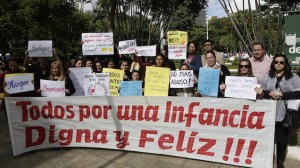 Mother’s Day—an emotional date where millions of women celebrate giving birth and the joy of children. However, for one ten-year-old pregnant girl in Paraguay, this day was not one she was hoping to celebrate any time soon.
Mother’s Day—an emotional date where millions of women celebrate giving birth and the joy of children. However, for one ten-year-old pregnant girl in Paraguay, this day was not one she was hoping to celebrate any time soon.
I was born and raised in Paraguay, a highly conservative and religious country in the middle of South America that recently garnered worldwide headlines over the news of this ten year old girl who became pregnant after being repeatedly raped by her stepfather. The news, which shocked Paraguayan society and horrified the world, quickly went viral due to the refusal of the Government of Paraguay to allow an abortion of the 21-week pregnancy. The stepfather is currently evading arrest while the girl’s mother has been incarcerated for complicity, despite her several denouncements of the abuse to local authorities.
According to the Minister of Health, Antonio Barrios, an abortion is out of the question since the pregnancy has passed 20 weeks. But the pregnancy – for a girl who weighs only 34 kilograms – represents an enormous risk to both her health and her life.
Paraguayan society has been shattered by this tragedy. The population is now intensely debating the legality and acceptability of abortion. By law, abortion is illegal in Paraguay, even in cases of rape, incest and severe fetus defect. But worse still are the official statistics regarding teenage birth—last year alone, 680 girls between the ages of 10 to 14 gave birth in what is quickly becoming one of the worst nations regionally and globally to become a mother.
Shockingly, at least two births per day are from girls under the age of 14. Most of these pregnancies were the results of sexual abuse and rape. Furthermore, according to data from the UN, girls aged 10 to 14 make up 2.13% of maternal deaths in Paraguay.
These appalling figures highlight not only the devastating conditions for women in Paraguay but also the complete failure of the state to protect and assist vulnerable citizens. While the WHO estimates that close to 20% of women suffer gender-based violence in the country, these numbers are likely severely underreported. Cases of sexual abuses are rarely prosecuted due to a lack of enforcement mechanisms and public trust in the justice system, and more often than not end up criminalising the victim.
This failure of justice in Paraguay is influenced by the lack of realistic separation between church and state. In issues of legality and citizens’ rights, religious views often overshadow the role of the state. When religious ideology dominates the state, when dogma overrules morality and justice, the end result is extremism, no matter in which God one believes.
Although this case has forced Paraguayan society to discuss the issue of abortion – one camp in favour of protecting the life of the young girl, the other seeking adoption for the possible child while disregarding the health of the mother – a broader conversation regarding the situation of women and children needs to start.
This case is not simply about abortion, it is about legislation that punishes child molesters less than cattle rustlers. It is about a society that to this day refuses to speak openly about supposedly “taboo” sexual abuse. It is about an incredibly limited or non-existent sexual education hampered by religious views. It is about a state that criminalises a mother seeking help and medical assistance for her daughter.
My views may not be widely shared in Paraguay – in fact, I have been accused of lacking any humanity – but I cannot stop thinking about this pregnant girl who turns eleven this May. She should be given a doll for her birthday, but instead may soon hold a real baby in her arms while celebrating her first Mothers’ Day.



